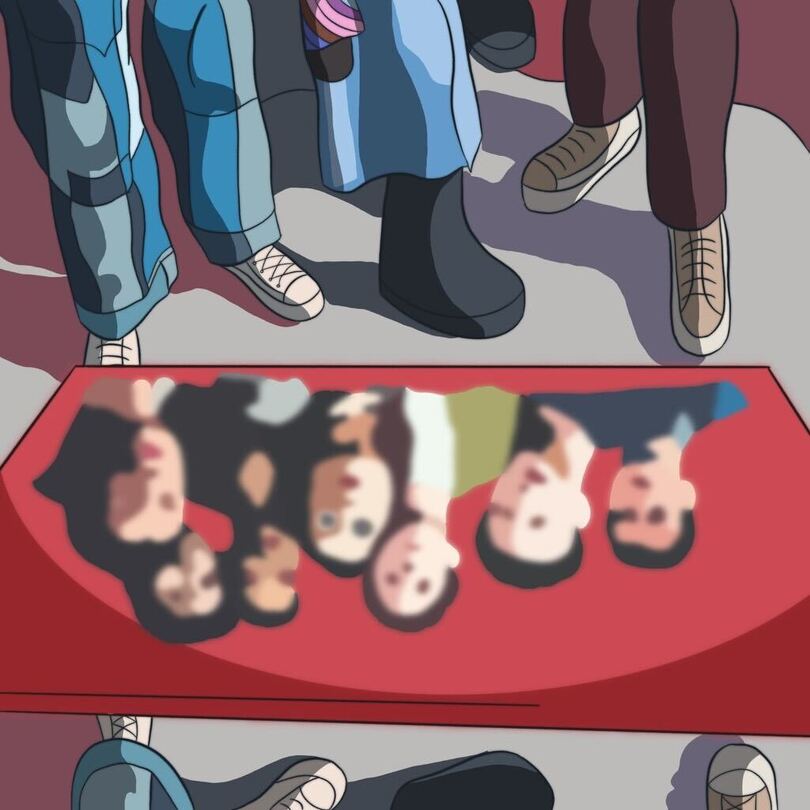Couch’s ‘Big Talk’ peers into band’s dynamics, maturation into boldness

Some songs on Couch’s new album draw from past experiences of the lead singer, Tema Siegel. Songs reflecting her healing journey from past relationships bring emotional depth to the songs, our columnist says. Maria Masek | Contributing Illustrator
Get the latest Syracuse news delivered right to your inbox.
Subscribe to our newsletter here.
“One mistake, you fall into the fire / You may be tense, but I bet I’m wound tighter / Tried you’re best, still I’m upset, and you’re on the wire.”
When hearing the band Couch for the first time, my friend said that their new song, “On The Wire,” sounded happy and perfect for summer with its bright horns and a groovy baseline, despite the rather melancholic lyrics.
This expresses how Couch’s iconic blend of indie pop, soul, funk and R&B may sound like the epitome of youthful optimism on first listen. However, as a fan of their previous two EPs, I can see a new boldness they’ve captured in their debut album.
Released on Oct. 24, Couch’s self-produced studio album “Big Talk” is all about embracing love, whether that be romantic, platonic or especially self-love. Still showcasing the Boston-based septet’s upbeat guitar, key licks and punchy horn interjections, the musicality and lyrics move past small talk to an even deeper and honest vulnerability — hence the album’s title.
The songs discuss the band’s relationship with each other, touring, romance and most importantly, the confusing freedom found in accepting and leaving behind heartbreak.
The first track of the record and the second single released, “On The Wire,” propels the listener into the theme of the album: the need to express emotional vulnerability. Tema Siegel, Couch’s lead vocalist, reflects on the band’s relationship amidst their tour on the road.
“Oh what a terrible day, I want a quick fix / I’m coming round for sympathy, can you show it?”
Longing is also a theme in “One Night,” where Siegel, accompanied by the smooth rising and falling of keys and horns, sings, “But what a sweet end it would be / One night again in your arms.”
She then switches from the word “sweet” to “bittersweet” at the climax of the song to reveal how the said relationship is built more on convenience than lasting authentic love.
The album slows down with the appropriately titled “Slow Burn,” where Siegel recounts the satisfying ache of being in a prolonged state of yearning for a high school crush. The velvety synth and distorted backing vocals contribute to the nostalgic vibe.
“Ooh I want that slow burn crushing back in high school / Kiss me till my curfew / I wanna ache again,” she sings.
The interplay between genuine romance and convenience peaks in “What Were You Thinking.” With unflinching clarity, Siegel puts words to the betrayal and heartbreak she felt when recalling an on-and-off-again relationship she had with an older musician at around age 20.
“What were you thinking / Handling a heart of 20 years like that / Testing the knife in / Just to stitch it up and pat yourself on the back.”
Listeners get time to breathe with “Window,” as the band trades their characteristic sound for their take on an acoustic ballad. An acoustic guitar, soft keys and sleek horns support an intimate but powerful reflection on slowing down and connecting back to one’s inner self.
“Little Less Over You” takes the listener to the middle of a lover’s healing journey, as Siegel poignantly accepts a relationship’s end in the instrumentally subdued chorus, “‘Cause I’m out of your head / And I can’t pretend anymore.”
Siegel’s journey shifts to one of self-discovery in “Middle Man.” She finds the man she was pursuing had fallen in love with her female best friend, and unexpectedly, so had she. Each aspect of the band is in full swing to create an air of both self-affirmation and a new kind of emotional turmoil.
“I don’t mean to scare ya / Don’t wanna embarrass myself / I wasn’t part of the plan.”
The bridge of “Transparent” describes Siegel’s reconnection with her values amidst her new environment, where a consistent drum beat drives the honest lyrics.
“And we’re not talking small talk / Baby, we’re talking big / Zero gravity, non-stop / That’s how I wanna live,” she sings.
The fact the song doesn’t have an ending and simply fades out portrays a lasting feeling of healing that comes from embracing sincere connections and the self.
Both “Lucky To Be Stuck With You” and “Static & Noise” express the desire to get close to someone, with the latter focusing more on the uncertainty of wondering if someone loves you just as much as you love them.
“You know my make and model / You know my middle name / Well, I could write your memoir / But you can’t say the same.”
Couch concludes the thematic journey of self-acceptance and diverse love in “So Myself.” The band confidently crescendoes as Siegel chants, “If I felt it once, I can feel it again / It’s somewhere in my chest / Yeah, it’s beating within.”
In their debut album, “Big Talk” highlights both the musical and personal relationship within the band itself. Every musician works in tandem to express a unified vision of finding, losing and regaining love, proving that Couch isn’t just a mere imitation of other popular pop bands, but a collective of determined individuals entirely self-assured in their sound.






